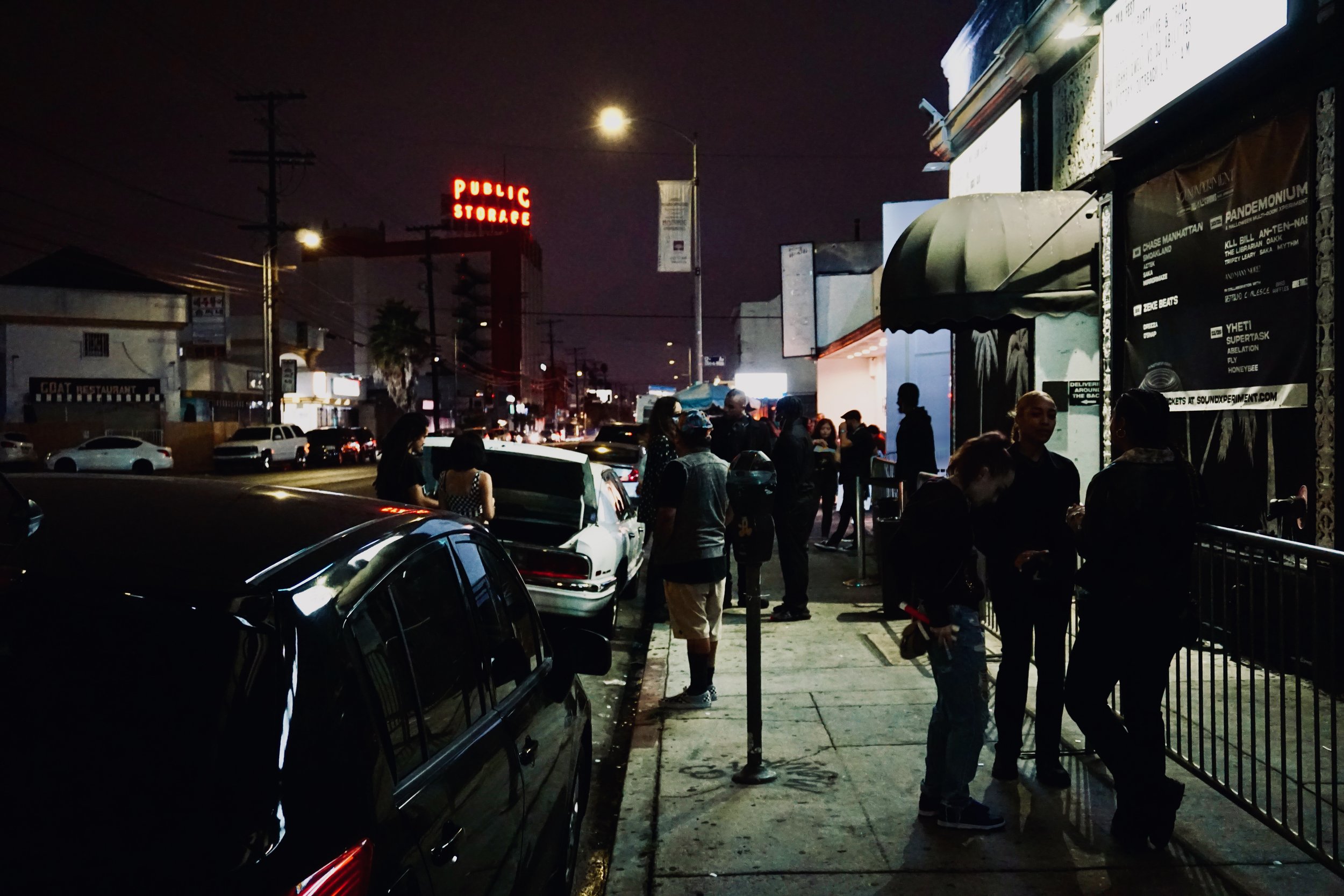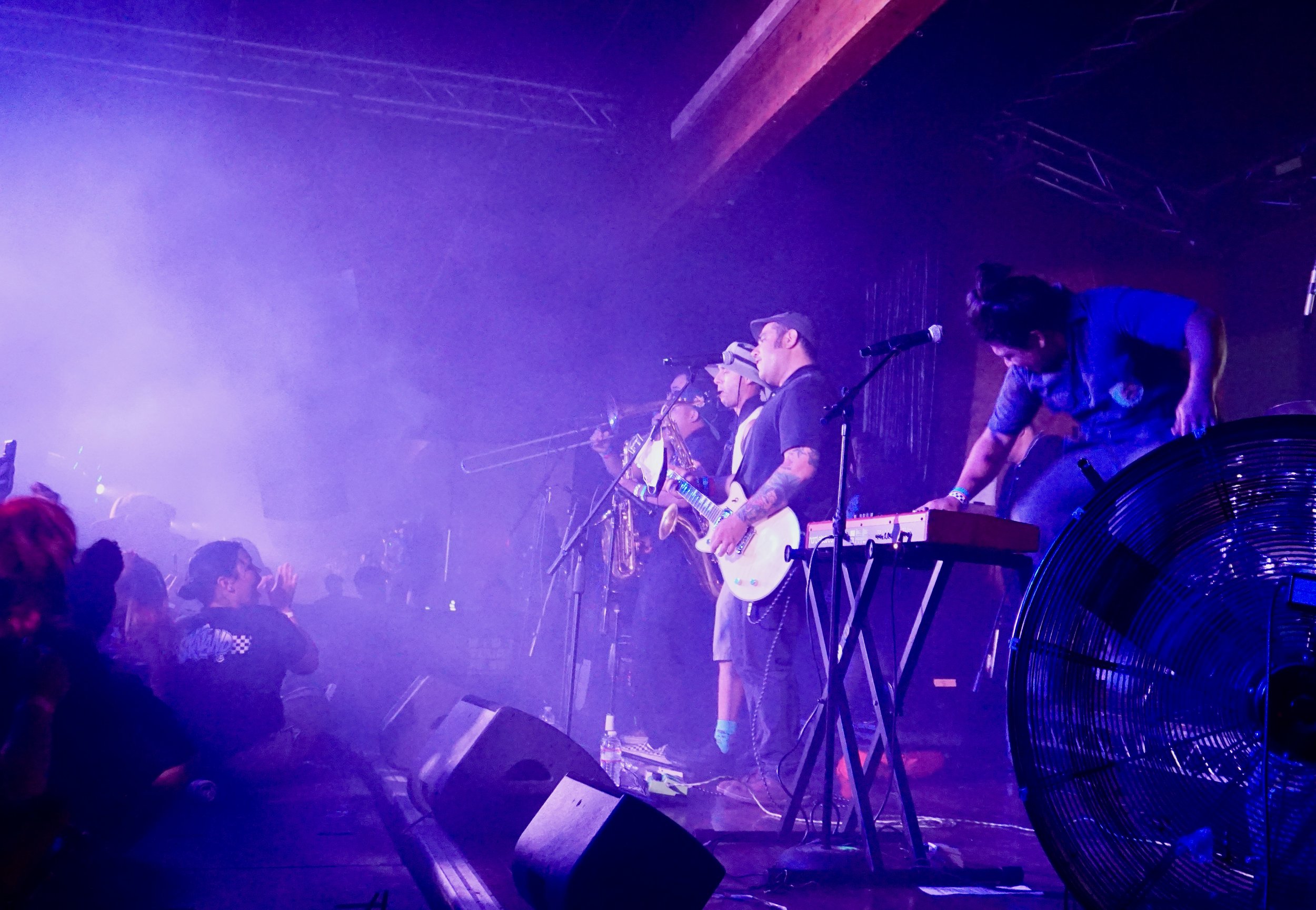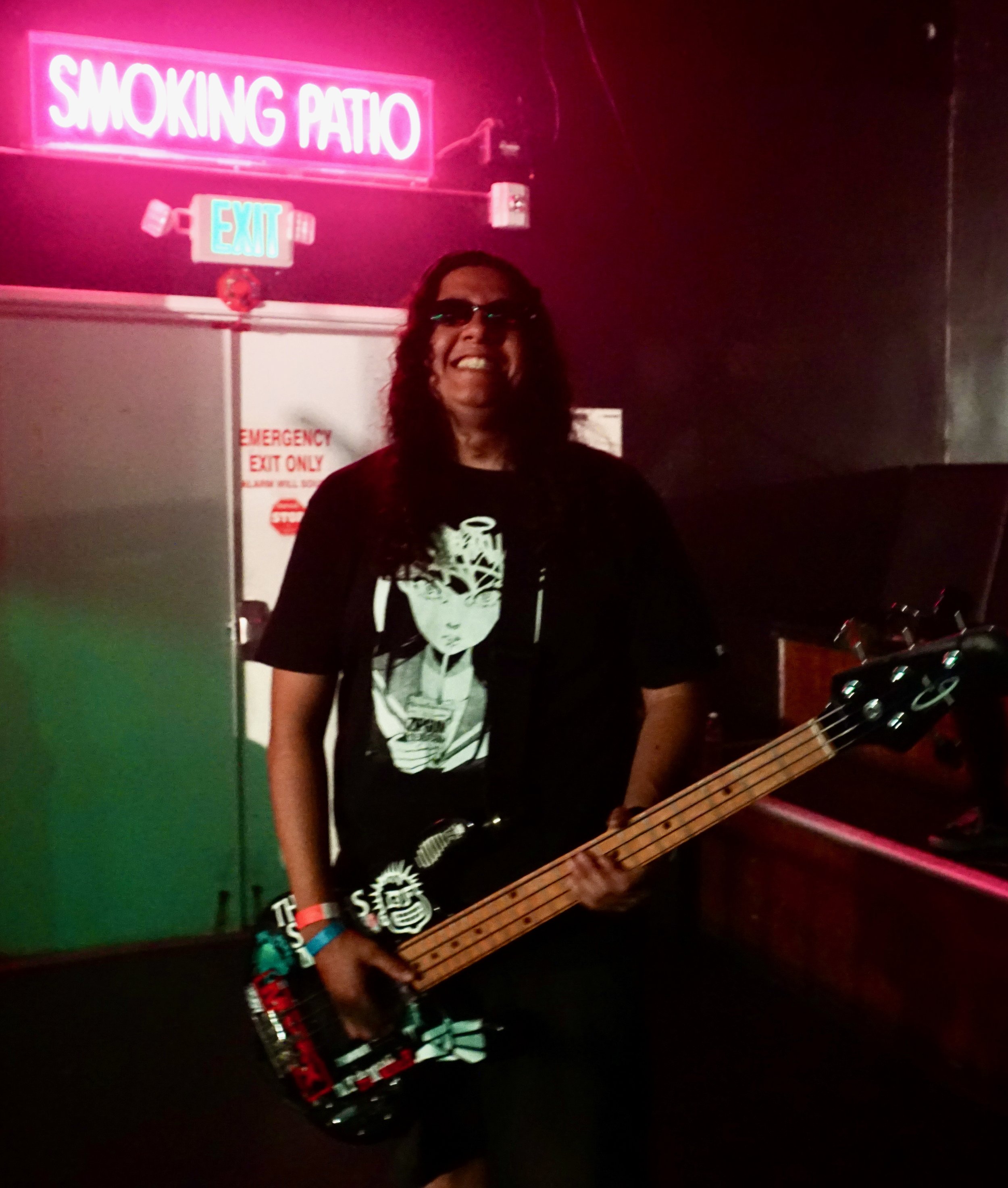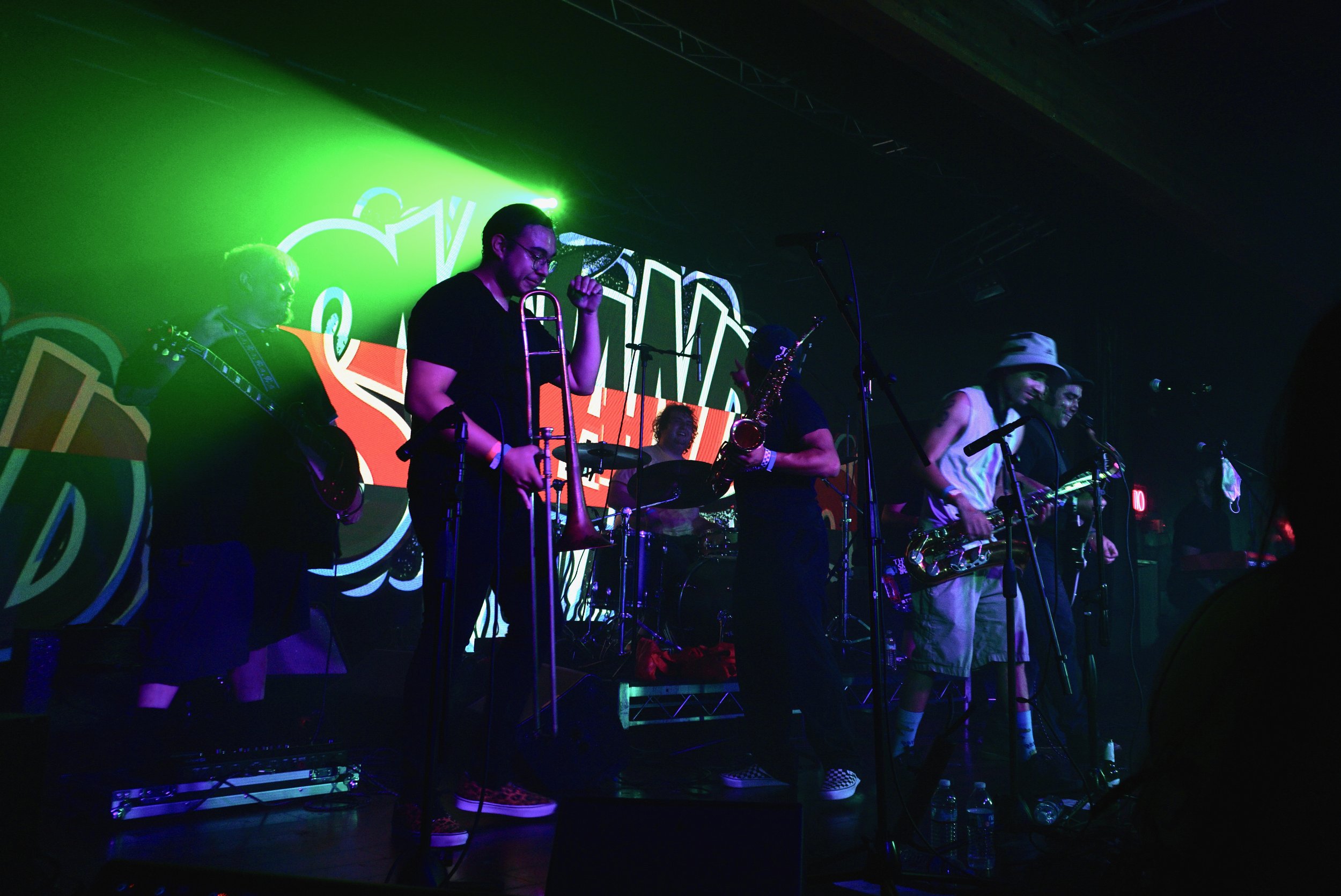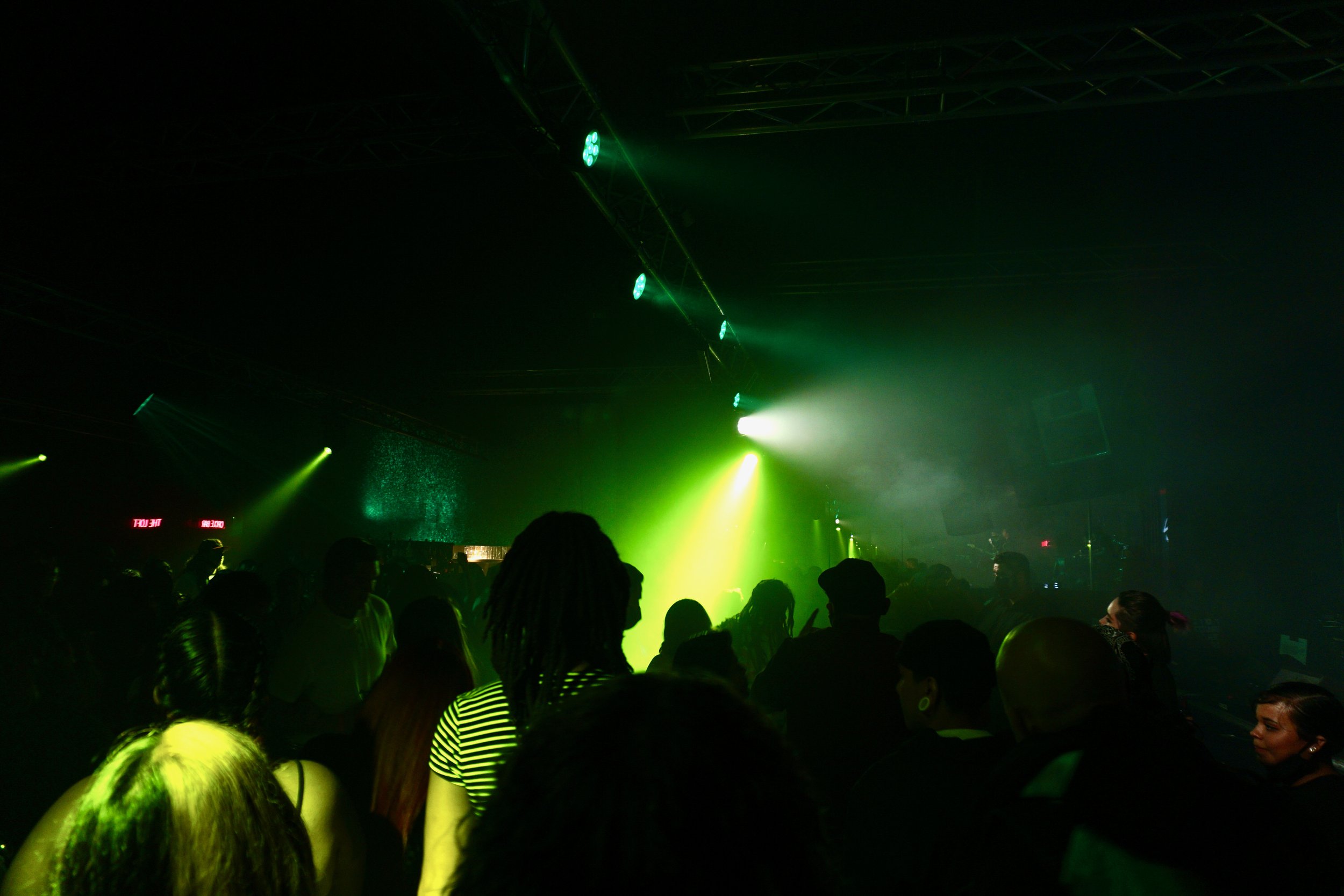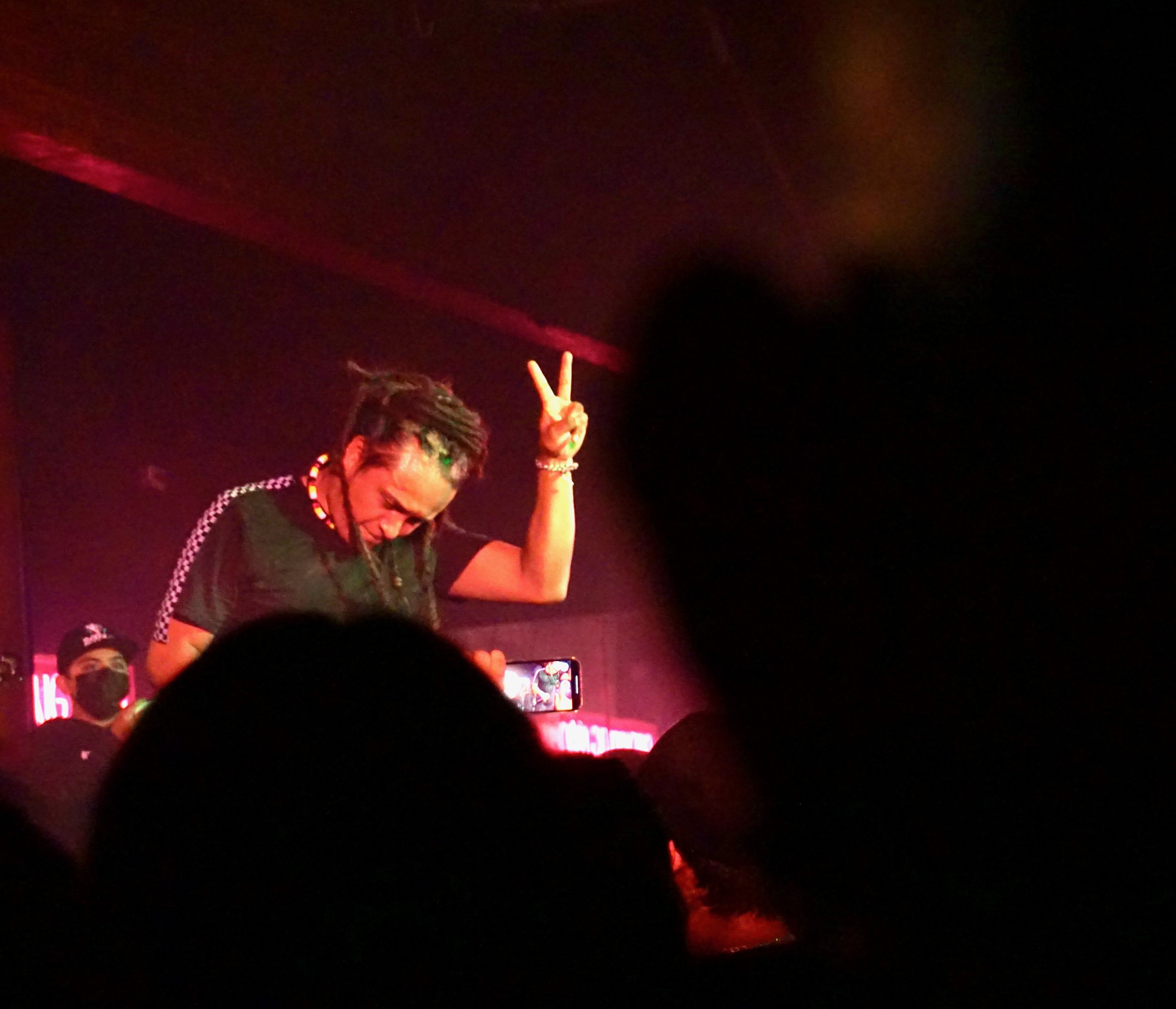By Lorali Mossaver-Rahmani
SKACORE:
Picking It Up from the LA Underground
A photo of the author holding up a camera that is obscuring her face. All photos in this essay were taken by the author.
This visual exploration of Los Angeles Chicanx and Latinx DIY (do-it-yourself) ska-punk—or “skacore”—music, is a nod to the skacore musicians who curate musical spaces of community solidarity and political resistance amidst the ongoing COVID-19 pandemic. It is my hope that this photo essay also encourages a more multimedia ethnography within music studies and the humanities. This project intentionally combines oral historical methods, alongside photographs, to encourage a multimedia methodological intervention within our disciplines to dynamically show–rather than tell–the stories we share and steward.
Political discourse, Spanglish-Spanish-English lyrics, intense punk vocalizations, blaring horn melodies, skanking and moshing in a circular motion (not to mention throwing putazos, or punches), and quick guitar up-beats all characterize the sounds and movement of a skacore show in Los Angeles. When ska musicians say the adage “pick it up”, they are referencing a quickening of tempo that “revs” up the crowds and gets everyone moving. This movement serves as fuel for musical and bodily momentum at shows, as well as political movements at the greater community level.
Skacore defines not just a syncretic musical style, but a way of being that incorporates Latinx diasporic community values and a spirit of desmadre, or recklessness. But before there was skacore, there was ska. The literature on ska music, the precursor to reggae, is vast regarding its critical role as a syncretic song genre that helped form a new post-independence Jamaican national identity in the 1950s/1960s; however, literature surrounding ska’s various cultural interactions is scant. Ska continued to develop and proliferate over the next thirty years throughout various locales in the Caribbean, the U.K., the U.S., and Latin America. The U.S. Orange County ska-punk scene, still operating outside the mainstream, received some popular recognition with “third wave” ska bands like Reel Big Fish, Sublime, Save Ferris among others, while ska-punk bands of color remained further ostracized and gate-kept from playing larger venues and festivals. Alongside, and in response to ska’s white-male dominated third wave, Latinx and Chicanx musicians created an underground scene in the 1990s1990’s that, to this day, is all their own. This subset of ska music is locally referred to as skacore. Since the mid 1990s, key players like Clemente Ruiz and skacore bands such as La Resistencia, Matamoska, La Pobreska, Raskahuele, Gabriela Penka, and more recently El Colectivo Sabinas (a primarily women-lead ska band), among others have played politically charged, “dirty”/punk-infused ska music in backyards, makeshift venues, clubs and theaters, and outdoor spaces throughout East LA, South LA, Hollywood, and Orange County.
This photo essay aims to document moments from Skaland 3, a three-staged ska festival at Catch One LA that was held in September of 2021. Skaland 3 was originally scheduled for early 2020–prior to the pandemic–but was shut down when all hell broke loose in March of 2020. Tickets that were purchased for the original date would still be honored and folks would be expected to mask-up and vax-up. However, although masks, vaccination cards, or negative COVID-19 test results were required to enter Catch One LA, there was no way to enforce the mask mandate once inside the venue.
Skaland 3 has been described as “massive” and as “the ska punk underground reunited”. Skaland 3 was the first national ska festival since the onset of COVID-19 in March of 2020. The energy of the venue was buzzing with cathartic highs from the crowd that had waited so long to experience another show. Musicians, too, were eager to perform and earn a living again. During the early months of the COVID-19 lockdown in LA, scene musicians had tried their best to keep the scene alive. Online benefit concerts and live streams grew wildly successful and even reached international participation, though they were not enough to financially sustain most DIY musicians. Through the skacore collective and DIY record label, The Skacore Cartel, Esteban Flores organized three separate “Quarantine for a Cause” virtual shows that hosted local musicians alongside international ska bands. Funds raised were donated to organizations that were in solidarity with BLM, abortion rights, and #StopAsianHate over the course of 2020 and 2021. These online live-streams were crucial in maintaining the LA skacore community, but nothing beats the feeling of a live show.
At the risk of over-romanticizing Skaland 3, the subject of this photo essay, I have heard it expressed that “the scene will never be the same”. Many skacore fans and community members have suffered great loss and withstood significant trauma as a result of COVID-19’s devastating effects on housing, public health care, and employment. This should not be understated. As the pandemic takes on new characteristics, the latest being the Omicron variant, the Chicanx and Latinx community in LA (and other POC and Black folks) in the surrounding areas continue to experience disproportionate effects of the virus. Skaland 3, in September of 2021, gave fans an excuse to put these pressing issues aside for a single evening. Time will tell how DIY musicians and their underground fanbase will adapt and innovate their approach to music making
As stated previously Skaland 3, organized by Evoekore Media, marked a significant coming-together of skacore bands from the local LA scene and beyond. The festival’s headliners were Jamaican ska legends, The Skatalites. The other performances included sets from the following skacore bands: Red Store Bums, Raskahuele, Matamoska, The Paranoias, Los Kong Fu Monkeys, Dskarados, Los Aggrios, Rundown Kreeps, Beta 7, Spare Change Ska, Trinidad Suave, Bomb Threat, Sancho Villa, and Los Nauticals among many others. My research with DIY skacore communities in Los Angeles focuses on the resilient and revolutionary musicians who intentionally build community through DIY affective performances on and off-stage. This affective work aimed at emotionally impacting concert goers is the heart and soul of the DIY skacore community and, as I contend, is conceptualized as unwaged labor that generates the meaning and value attached to the Los Angeles skacore DIY scene. This affective labor has become ever more important since the pandemic began. Subversive lyrics underscoring issues related to immigration rights, border politics, discrimination, police violence, patriarchy, and capitalism are juxtaposed with songs that speak of daily life, love, partying, “letting it all go”, and throwing putazos [punches] in the pit.
With allegiance to agentive voice, I include a large quote from Clemente Ruiz, skacore event organizer, musician, photographer and producer, discussing the skacore scene. He explains,
People sometimes here in the US think ska bands died, but it grew in other parts of the world. And then, it leaked back into the Latin ska bands that we have in L.A. Most people in the rest of the world don't expect Latinos in L.A. to listen to ska music–or even know about it–but it's what we do...I’m a musician, producer, I’m also the guy behind the biggest ska punk events we have in L.A…If I didn't have music, and I didn’t have the ska punk shows to go to I don’t know where I would’ve been. Latin ska punk has influences from all over the place. It’s a genre that collects bits and pieces of everything from Jamaican reggae, to hardcore, to the Mexican Latin ska–it’s just a clash of everything. Latin ska started popping up in L.A. in the mid-late 90’s. It was in the neighborhood. We had a hard time playing legitimate venues. That’s kinda what sparked me having to organize some of these events, because no one would do it for us. I think a lot of these Latino kinds are attracted to ska music–the way people dance, the way people dress; they just find themselves in that. The rhythm really gets you going. It touches a lot of people. To a lot of these kids that go to our shows it helps them find themselves. It makes them feel like they do belong to something. It’s a very personal connection to them. (Ruiz 2017)
As the written word, often fails to capture the ephemeral embodiment of direct experience, I offer these photographs and oral history quotations as a humble expression of what it may mean to be a part of the LA Skacore community during a global pandemic.
1. Outside Catch One LA: Setting Our Scene
Outside Catch One LA at sunset, where a small crowd is standing in line outside of the venue.
A pickup truck with boxes piled on top of it and in the trunk.
Outside Catch One LA at night, where a crowd is standing outside the venue.
2. Esteban Flores, Robert Verdugo, Eddy Rodriguez, and Jose Padilla of Matamoska
Esteban Flores is currently the producer for the Skacore Cartel, a DIY artistic collective that records and produces local skacore artists to champion community musicians and their work. Flores plays keys in the LA skacore band Matamoska, as well as the Philadelphia ska band, Catbite, and the Portland-based ska and reggae band, The Bandulus, among many other groups. I met Flores at Skaland 3 behind the Matamoska merch booth. His energy was contagious and his dedication to the band was apparent. Excerpts from our oral history interview are below the photo.
Esteban Flores performing on stage, reaching out to a fan.
Esteban Flores: Coming from LA, I just want to be like, “dude hands down I swear that we are the best scene in the U.S.” And I've played in a bunch of states. I’ve played in the most pocket states. I've played in the most niche areas. I’ve played some really nice festivals but, like, nothing compares to the energy of an LA ska show. Like nothing.
Yeah, but very much, it's just like during my college years–my years at Cal State LA– that’s when I really got into my identity in the scene, well not just my identity in the scene but my identity as a person and also my identity in the scene's a privilege to be able to have that much, not authority, but like that much “juice”. People are just like “hey, I want you to help produce my group” and I go, “yeah obviously I’m going to help you, you know you guys obviously can't afford a million dollar producer who's going to make you sound amazing, but I can give you whatever I have”, you know? And whatever I have has gotten me here so hopefully it can get you over there.
Matamoska performing at Skaland 3.
Jose Padilla, lead singer and guitarist for Matamoska, greets the crowd.
Robert Verdugo, trombone player for Matamoska, sings back-up vocals on the far left. AJ Acdan (alto sax) and Jovan Loera (tenor sax) are pictured to the right of Verdugo. Jose Padilla stands at the far right.
Eddy Rodriquez, bassist for Matamoska, before their set.
Robert Verdugo on stage with fellow bandmates.
Robert Verdugo (Rob), who is reconnecting to his Latinx heritage, says how important it is to explore your own background and be curious about who you are. He says it's important to ask yourself, “Who are my parents? Where do my parents come from? Who am I? Where do I come from? Where do I fit within Southern California's plethora of cultures... What do I identify with? Why do I identify with that? Why do I love playing songs where I don't understand some of the lyrics? Why do I play songs where I sing lyrics in Spanish and I don’t know what I’m saying? You know, like what about that do I really connect to? Is it just because I am having a good time? A lot of times, it is. A lot of the time I'm having so much fun with my bandmates and, you know, they push me to do stuff like that. That’s what it’s about, we are all singing in Spanish together.”
Rob: When people hear ska they think of, there's like a meme, it's like “ska is what an 8th grader hears when his mom gives him mozzarella sticks,” you know? And, like, ska is a half-century old tradition and there's so many different types of ska. There's so many different people that love to make ska. It's more than mozzarella sticks. Now, it's about cultural identity, which is a lot heavier than mozzarella sticks [laughs].
Now, you know, it’s such a big part of my life that I am able to kinda like throw it away and say, “yeah I’m in this ska band” um, I don't expect any sort of reaction. Before, whenever I would tell people I would kinda expect the reaction of “you play what music? Like, guitar with horns?” I think that I felt almost ashamed when I first started playing in the band. You know, it wasn't what my peers were doing. I was going to music school and they were playing jazz and they were playing a lot of classical music—you have to sound like this, and you have to sound like that. Now I just do not care. I'm very confident, both in the love I have and the passion that I have for being a part of Matamoska, and just being a part of the LA ska scene because I've realized that it's a lot bigger than anybody. It's a lot bigger than you and I, the ska punk scene. The ska scene in general, in the world, is a lot bigger than anybody. Now I am able to say, “yeah, like, I've traveled the country, I've had offers to travel the world playing this music... Here I am with all this collaboration and all these developing years of collaboration with people all over the country—all these friends that I've made all over the country—you know? I’m very proud of that. I'm even prouder now that it's through this band.”
3. Inside Skaland 3
A blurred photo of a figure whose back is towards the camera.
Inside Green Light, where it’s crowded.
A blurred photo of people dancing.
Longtime Skacore fan and amateur photographer allowed me to take his portrait as we stood stage left of Catch One’s main stage.
Lead singer of Raskahuele shoots the crowd messages of unity and a peace sign at the end of their set—always a crowd favorite.
Excited to be at the first major show since the beginning of COVID-19, two Skacore fans pose for a photo.
4. Chris and Ash with Desmadre Y Medio
I first met Chris and his partner, Ash, at the entrance to Catch One LA while I stood in line for Skaland 3 with my camera in hand, and vaccination card in pocket. Experts from our oral history interview are below.
Chris: My name is Chris, I am the founder of Desmadre y Medio which is a lifestyle brand which represents the underground scene–the ska shows, the punk shows, and pretty much Latinx music you could say. Like the name says it, “Desmadre y Medio” [recklessness/fucking shit up and a half]. It's about shows, having fun, and yeah [laughs] living that punk style life, or that rock style life, or whatever, you know?
I’ve always been close to my roots. I grew up in TJ, so i was in Tijuana, Mexico, since I was 9 years old, then I moved to North Hollywood, to the hood and stuff like that. I got to see both worlds, like the Mexican and Chicano people– I lived it both [laughs]... no matter where I went I was always apart of the street scene, whether it was skateboarding, graffiti or just like rock en español, I had my cousins who introduced me to ska at a very young age–and punk and all that stuff.
Chris (left) and Ash (right) launching Desmadre y Medio outside Catch One LA.
References
Augustyn, Heather. 2010. Ska: An Oral History. North Carolina: McFarland & Company, Inc., Publishers.
———. 2013. Ska: The Rhythm of Liberation. Plymouth: Scarecrow Press, Inc.
Black, Pauline. 2011. Black by Design: a 2-Tone Memoir. London: Profile Books Ltd.
Carnes, Aaron. 2021. In Defense of Ska. New York: CLASH Books.
Chris. 2021. (Founder of Desmadre y Medio). Oral History Interview by Lorali Mossaver-Rahmani. Zoom. Los Angeles California. October 10, 2021.
Dunn, Kevin. 2016. Global Punk: Resistance and Rebellion in Everyday Life. New York: Bloomsbury Publishing.
Flores, Esteban. 2021. (Skacore Musician and Co-director of Skacore Cartel). Oral History Interview by Lorali Mossaver-Rahmani. Zoom, Los Angeles, California. October 10, 2021.
Kauppila, Paul. 2006. “‘FROM MEMPHIS TO KINGSTON’: AN INVESTIGATION INTO THE ORIGIN OF JAMAICAN SKA.” Social and Economic Studies 55(1): 75–91. http://www.jstor.org/stable/27866458.
King, Stephen A., Barry T. Bays, and P. Renée Foster. 2002. Reggae, Rastafari, and the rhetoric of social control. Jackson: University Press of Mississippi. http://public.eblib.com/choice/publicfullrecord.aspx?p=840338.
Ruiz, Clemente. 2017. “Picking It Up Again: L.A.’s Latin American Ska Scene.” Great Big Story, accessed on December 7, 2021. https://www.youtube.com/watch?v=54RzKGIAv9w.
Verbuč, David. 2022. DIY House Shows and Music Venues in the US: Ethnographic Explorations of Place and Community. New York: Routledge.
Verdugo, Robert. 2021. (Skacore Trombonist for Matamoska). Oral History Interview by Lorali Mossaver-Rahmani. UCLA, Los Angeles, California. October 6, 2021.
Viesca, Victor Hugo. 2004. “The battle of Los Angeles: The cultural politics of chicana/o music in the greater eastside.” American Quarterly, Los Angeles and the Future of Urban Cultures 56: 719-739. Accessed on October 25, 2021.
“Voces of a Pandemic”. 2020. Voces Oral History Center, Moody College of Communication, The University of Texas at Austin. Accessed on December 7, 2021. https://voces.lib.utexas.edu/voces-of-a-pandemic-stories?page=1.
White, Garth. 1998. “THE EVOLUTION OF JAMAICAN MUSIC PT. I: ‘PROTO-SKA’ TO SKA.” Social and Economic Studies 47(1): 5–19. http://www.jstor.org/stable/27866162.




